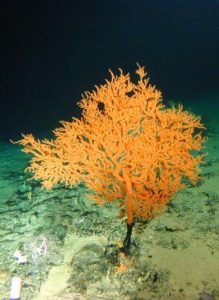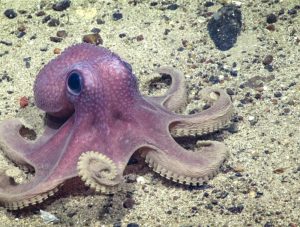Bites from the Deep
JANUARY- JULY 2020
DEEP-SEA FISHERIES
-

Photo: NOAA Hawaiian Research Lab In February, the DSCC along with member organizations ECO and Greenpeace New Zealand attended the 8th Annual Meeting of the South Pacific Regional Fisheries Management Organisation (SPRFMO) Commission. New Zealand had submitted a paper that was highly problematic as it sought to justify destruction of vulnerable marine ecosystems (VMEs) if there are more VMEs elsewhere. In response, the DSCC sent a strongly worded seven-page rebuttal paper. As a result, New Zealand withdrew the paper.
- The court case against Talley’s (one of New Zealand’s largest food supply groups) for fishing illegally, remains ongoing. In February, DSCC members and other ENGO allies in New Zealand-based campaign alliance brought to the attention of national press a donation from Talley’s to the New Zealand First Foundation, an arm of the political party in government which supports the fishing industry, highlighting a serious conflict of interest. This caused the Prime Minister to distance New Zealand First MP Shane Jones’ from fisheries policy decision-making.
- In March, the DSCC signed on to a letter along with the Pew Charitable Trusts and WWF Japan, sharing concerns about transparency at North Pacific Fisheries Commission (NPFC) meetings, including a lack of observer access to meetings sessions and documents, and lack of public access to key information and Commission documents. This should be publicly available well ahead of meetings.
- In May, the DSCC took part in theNPFC Bottom Fisheries and Vulnerable Marine Ecosystems (VME) Scientific Subcommittee meeting and organized to two lead scientists involved in research expeditions in the NPFC Area, Dr Amy Baco-Taylor and Dr Les Watling, to take part in the meeting – both have called for seamounts to be closed to bottom trawl fishing.
- From the end of May to the beginning of
June, the DSCC took part in the Northwest Atlantic Fisheries Organization’s (NAFO) scientific committee meeting where we focused on the need for protection of several VMEs on the southern tip of the Grand Banks, off Newfoundland, Canada, where no VME closures have yet been established. We also pushed for more protection for sea pens and black corals on the Flemish Cap, an area of shallow waters in the north Atlantic Ocean. - • For this year’s World Ocean Day in June, the DSCC and its members in New Zealand (Greenpeace, Forest and Bird, WWF, LegaSea, and Our Seas Our Future) hosted a webinar- ‘Creatures of the Deep’, which focused on seamounts and the creatures that live on and around them.
- The European Commission is running an online survey to solicit views from members of the public on whether the EU deep-sea fisheries regulation is important and whether it has been effectively implemented. The DSCC campaigned between 2012-2016 to get this regulation adopted. However, it has not achieved many of its objectives due to poor implementation, enforcement and control. We are encouraging input to this online survey before August 5th to stress the importance of the regulation, the need to protect deep-sea species and ecosystems, and the need for stronger and swifter implementation.
DEEP SEABED MINING
-

Photo: NOAA Office of Ocean Exploration and Research In January, the DSCC attended a panel session on ocean minerals hosted by the World Economic Forum at Davos. The panellists made a powerful case against mining the deep sea with comments and questions from the floor reinforcing this view. Notably, Sylvia Earle made an impassioned plea to protect the deep, stressing “We now know how critical the ocean is to our life support systems.”
- In February, the DSCC attended the ISA Council meeting. Much of
the discussion was administrative in nature, with the main substance
reserved for the second session planned for July but now rescheduled for October. Among several working group meetings, the DSCC joined one on finance, questioning the 1% royalty payment earmarked for the environment and emphasised the importance of an accurate valuation of deep-sea ecosystem services. - In March, DSCC members Fauna and Flora International (FFI) released a new report in March entitled, ”The risks and impacts of deep-seabed mining to marine ecosystems”. This focused on the risks posed to biodiversity and vital ocean services by deep-sea mining and as a result, Sir David Attenborough has called for a moratorium on deep-sea mining.
- In May, the Deep Sea Mining Campaign, a DSCC member organization, released a report entitled, “Predicting the Impacts of Mining Deep Sea Polymetallic Nodules in the Pacific Ocean’ focusing on the ‘extensive’ and ‘severe’ impacts of nodule mining in the Pacific Ocean.
- The DSCC launched a public outreach campaign called #DeepTrouble to mobilize pressure and reframe the debate around deep-sea mining, supported by a set of campaign materials, including these factsheets.
- In June, the DSCC participated in a Financial Model seminar hosted by the ISA. Three different seminars were organized on the same subject, dividing member states, contractors and observers, raising concerns about transparency and participation. In a letter to the Secretary General, the DSCC expressed these concerns, noting that a situation where observers may not observe the discussions had by member States and contractors conflicts with the ISA Council’s own Rules of Procedure.
- Also in June, the DSCC hosted a World Economic Forum Virtual Ocean Dialogue, together with the World Wide Fund for Nature (WWF) and Pacific Network on Globalisation. In the session, stories from frontline indigenous leaders offered a Pacific people’s perspective on the “sustainable relationship” with the ocean and the interconnectedness of deep-sea environments and the rights of both human societies and nature.
- Toward the end of June, DSCC members presented the case for a moratorium on deep seabed mining at a hearing in Belgian parliament.
- In July, the DSCC launched Game Over, a game to help build public understanding on deep sea mining and aggregate public support for a moratorium.
UPCOMING MEETINGS AND EVENTS
- 7-16 October 2020: ISA 26th Session – originally scheduled for July (postponed) – Kingston, Jamaica
- 7-15 January 2021: IUCN World Conservation Congress (WCC), originally scheduled for June 2020 (postponed) – Marseille, France.
- Second quarter of 2021: Convention on Biological Diversity – meeting of the Subsidiary Body on Scientific, Technical and Technological Advice (CBD SBSTTA), originally scheduled for August 2020 (postponed) and Conference of the Parties (COP15), originally scheduled for October 2020 (postponed) – Kunming, China
- 2-4 March 2021: The Economist World Ocean Summit – Lisbon, Portugal
- Likely to occur in the first half of 2021: UN Ocean Conference, originally scheduled for June 2020 (postponed). World Economic Forum Friends of Ocean Action Virtual Ocean Dialogues being run in its stead.
